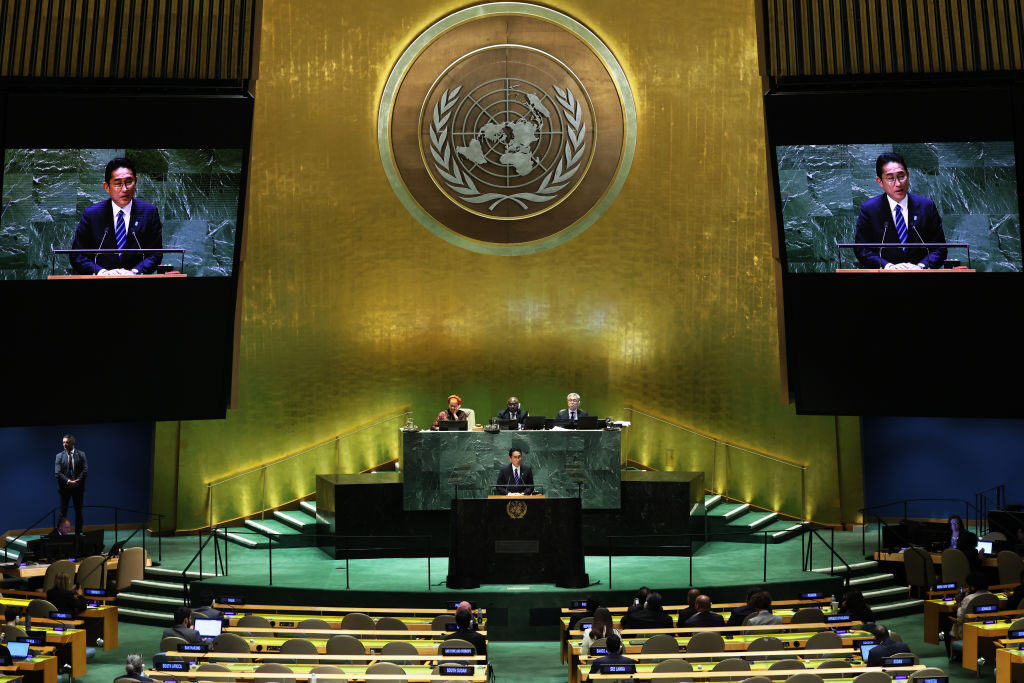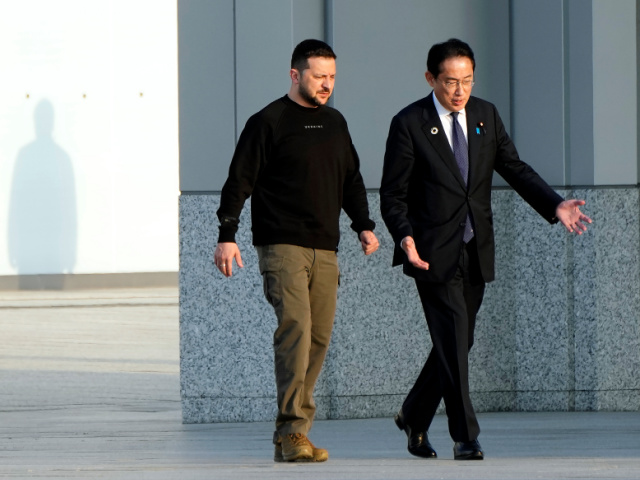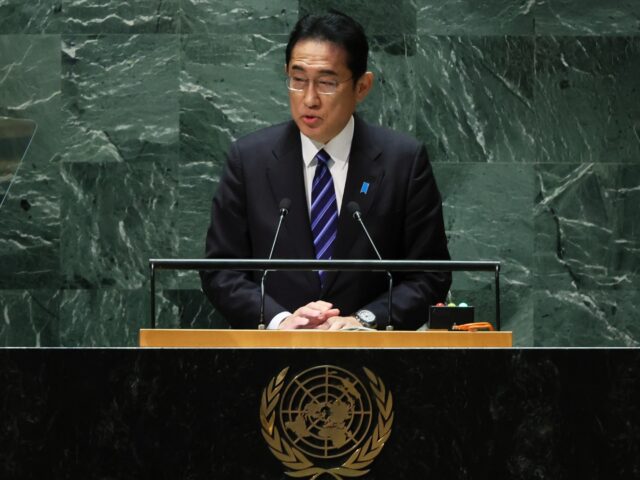Japanese Prime Minister Kishida Fumio used his address to the United Nations General Assembly on Tuesday night to invite North Korea’s communist dictator Kim Jong-un to meet “face to face” without preconditions.
Japan and North Korea have fraught relations as a result of the Kim regime regularly threatening nuclear attacks on Japan and terrorizing civilians with regular missile launches over their homes. The Kim regime indoctrinates its citizens to hate Japan for its years of imperial occupation of the Korean peninsula, regularly publishing screeds in its state media outlets demanding outrage over 20th. century human rights atrocities.
The historical abuse of Koreans by Imperial Japan remains a point of immense contention between Tokyo and Seoul, as well, but conservative South Korean President Yoon Suk-yeol has endeavored to improve relations with Japan on the grounds that both face a mutual enemy in Chinese and North Korean communism. Yoon’s attempts to elevate relations with Japan are unpopular in his country.
Kishida made the invitation on the same day that Kim returned from conducting “immortal external revolutionary activities” in far-east Russia, meeting with Russian strongman Vladimir Putin, inviting Putin to visit Pyongyang, and receiving lavish gifts including sanctions-violating “kamikaze” drones. Japan and Russia have never resolved territorial issues stemming from World War II and thus remain in a technical state of war, though active hostilities ended nearly a century ago.
Kishida’s invitation also follows a similar suggested meeting by leftist American President Joe Biden, whose White House confirmed in August that Biden asked Kim for an in-person meeting but the North Korean government ignored him.
Kishida’s speech on Tuesday was the last delivered that day, the opening day of the General Assembly.
“Japan’s policy on North Korea remains unchanged. Japan seeks to normalize its relationship with North Korea, in accordance with the JapanDPRK Pyongyang Declaration,” Kishida told the U.N., “through comprehensively resolving the outstanding issues of concern such as the abductions, nuclear and missile issues, as well as settlement of our unfortunate past.”
“From the perspective of opening up a new era together, I would like to convey my determination to meet with President Kim Jong-un face to face at any time without any conditions,” Kishida offered, “and would like to hold high-level talks under my direct supervision to realize a summit meeting at an early time.”
Kim’s father, late dictator Kim Jong-il, allowed former Japanese Prime Minister Koizumi Junichiro to visit Pyongyang in 2002, but the rare event did little to improve bilateral relations. Kim Jong-un has not indicated that he is open to attempts to warm ties with Japan.
North Korea’s state propaganda arms are rife with stories disparaging Japan, including outrage over the massacre of Koreans following the 1923 Kanto earthquake, agitation over a Japanese “military provocation” in 1875, and a more general, unsubstantiated claim that “murder [is] a prevailing trend in Japanese society.”
Outside of discussing North Korea, Kishida abstained from identifying other problem states by name with the exception of Russia.
“Russia, a permanent member of the Security Council, is infringing upon international law and the ‘rule of law,'” Kishida denounced, referring to the ongoing Russian invasion of Ukraine. “Unilateral changes to the status quo by force or coercion are unacceptable anywhere in the world. The situation, which the General Assembly has repeatedly condemned as a violation of the UN Charter and human rights, must be rectified as soon as possible and the nuclear threat must be ended.”

Japanese Prime Minister Kishida Fumio speaks during the United Nations General Assembly (UNGA) at the United Nations headquarters on September 19, 2023 in New York City. (Michael M. Santiago/Getty Images)
Kishida has involved Japan significantly in the Ukraine war and made an unprecedented surprise visit himself to Kyiv in March.
The Japanese prime minister notably did not mention China in his remarks, though several of the issues he raised directly concern the rogue communist state. Kishida heavily emphasized the need for an end to the manufacture of nuclear weapons, noting that he is a native of Hiroshima, one of two cities in the world to be attacked with nuclear weapons during a war.
“As we speak, we are faced with the threat of the reversal of the downward trend of the global number of nuclear weapons,” Kishida observed. “The significance of a treaty banning the production of fissile material for nuclear weapons or other explosive devices (FMCT), which was avowed here in the General Assembly 30 years ago, has not diminished by any measure.”
China is at the forefront of this trend, dramatically increasing its nuclear stockpile unrestrained by any international laws, as it is not proliferating that technology to other states.
Similarly, Kishida mentioned the need for a “free and open Indo-Pacific … based on the principles of freedom, the rule of law, inclusiveness, openness and diversity” – an apparent, but nameless, condemnation of China’s ongoing colonization of non-Chinese territory in the South China Sea.

Ukrainian President Volodymyr Zelenskyy, is escorted by Japanese Prime Minister Fumio Kishida, right, to the Cenotaph for the Victims of the Atomic Bomb at the Hiroshima Peace Memorial Park, in Hiroshima, western Japan Sunday, May 21, 2023. (AP Photo/Eugene Hoshiko, Pool)
Much of Kishida’s speech was dedicated to a conceptual respect for “human dignity,” which he deemed necessary for the success of any United Nations endeavor.
“I believe we should go back to the very basic foundation of treating human life and dignity with paramount importance,” he said. “We should aim for ‘A World Caring for Human Dignity,’ where vulnerable people can live safely and securely.”
Respect for human dignity, he argued, required the United Nations not to overlook the rights of individuals in its sweeping global governance proposals: “The dignity of the individual must not be neglected as states and the international community tackle global challenges.”

COMMENTS
Please let us know if you're having issues with commenting.